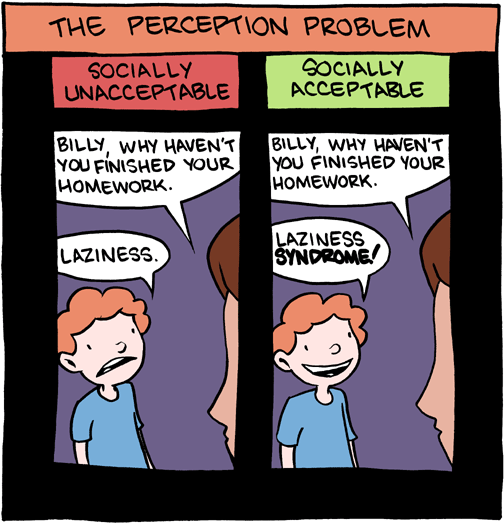The fine line between disability and vice
Created 10 Aug 2014 • Last modified 22 Aug 2022
The difference between qualities we think people deserve (like laziness or kindness) and the qualities we think people are merely subject to (like blindness or perfect pitch) is often indistinct. I argue that the practice of doling out praise, blame, punishment, and reward on the basis of whether people really deserve it is ultimately counterproductive.

Not everybody is as competent or helpful as everybody else. There are all sorts of ways in which one person may be less able, or less beneficial to society, than another person. Now think
- on the one hand, of self-sacrifice, criminal behavior, charisma, being good at math, being bad at golf, laziness, greed, and kindness;
- and on the other hand, of blindness, mental illness, cancer, old age, wealth, birth defects, height, and handedness.
What distinguishes these groups of qualities is that, in general, we feel people deserve the qualities in group 1, or at least deserve praise or blame for having them, whereas we don't feel people deserve the qualities in group 2. In short, type-1 qualities are viewed as volitional or earned whereas type-2 qualities are viewed as acts of God. (Hold onto your fedora; that wasn't a theological claim, just a figure of speech.)
Not everybody agrees about which qualities belong to which types. Certain controversies about obesity and drug use can be characterized as a struggle between people who call these qualities type-1 and people who call them type-2. (These arguments may also take the form of arguing about whether a quality is a mental illness, or whether it's a disability, or whether it's genetically determined. But these forms introduce red herrings.) As this example shows, which type people assign a quality to tells us a lot about how people view the quality, and how they will treat other people according to that quality.
Having established this little taxonomy and shown that it's Serious Business, I want to make two points:
Point 1: It's a judgment call which type a quality is.
People often speak as if it were a matter of fact, or science, or logic, which type a quality is. It actually isn't, or at least not just that, because ethical judgments are a big part of it, too.
Let's return to the example of drug use. Particularly, alcoholism. There's been a big shift over the past century in thinking of alcoholism as a consequence of low moral fiber, to thinking of it as an disease. I'm sure that this change has made the world a better place, particularly for alcoholics and their families. But I'm perturbed when people imply that this was a scientific advance, that science demands we view alcoholism as a disease rather than a personal failing. Whether alcoholism is type-1 or type-2 is not something any amount of empirical research can tell us. Research can tell us about the consequences and causes of alcoholism, but not whether to, given this knowledge, morally condemn alcoholics. To decide whether to morally condemn alcoholics, we need to decide what deserves moral condemnation, or rather, what purpose moral condemnation should serve. Science is great and all, but it can't replace philosophy.
Point 2: Everything should be type 2. No exceptions.
Per what I just said, this is a judgment call. This is just my ethical opinion. But let me explain why I think you should share this opinion.
Simply put, I think the existence of type-1 qualities does no good and a lot of harm. Why should we insist people get what they "deserve" in some cosmic sense?
This isn't to say we can't have jails or awards or praise or blame. We can use any of these things in a pragmatic spirit, reasoning that, for example, people are more likely to do useful things if we give them medals for doing useful things. And something like the type-1/type-2 distinction reappears in that we need to be cognizant of how much self-control people have. There's no sense in punishing people for being short, because they can't choose to be taller, so punishing short people won't cause anybody to get taller. On the other hand, people can (at least in some cases) choose whether to commit crimes, so the threat of punishment ought to (at least in some cases) actually prevent crime.
Those parenthetical at-least-in-some-cases should remind us that figuring out how much self-control somebody has can be difficult. How much do circumstances and personality force a person to become a criminal? How capable are poor-performing students of improving their grades? How capable are obese people of losing weight? These, at least, are empirical questions, so if we use my strategy of abandoning type 1 altogether, we can replace the blame games with science.